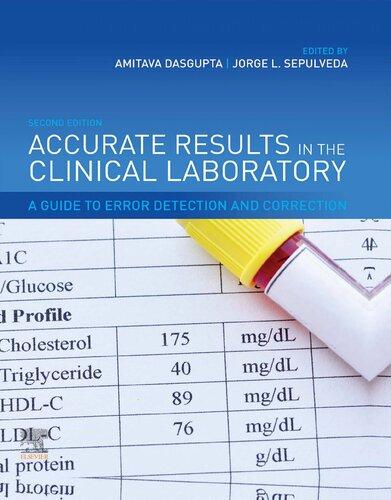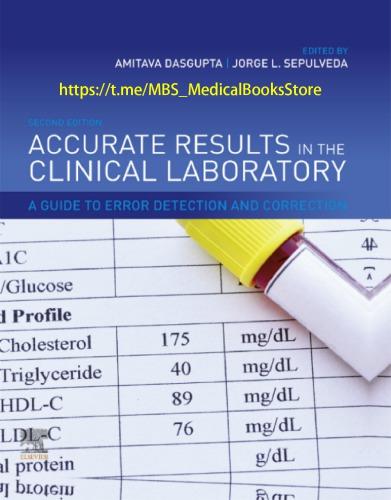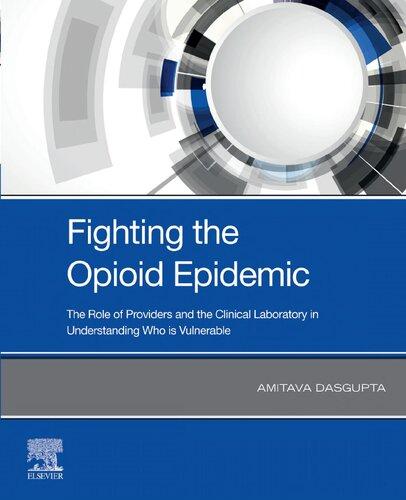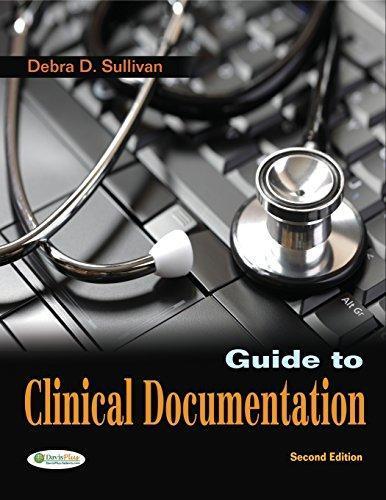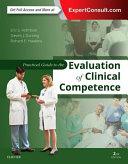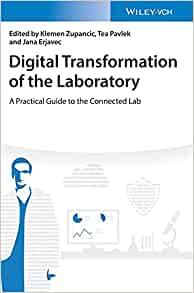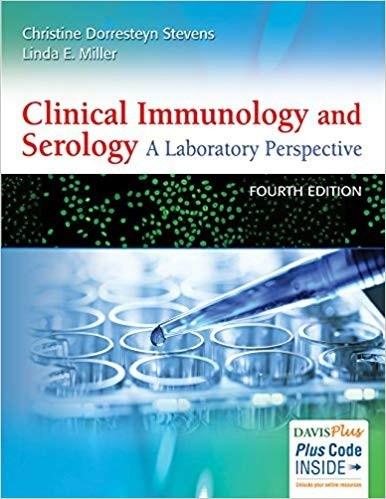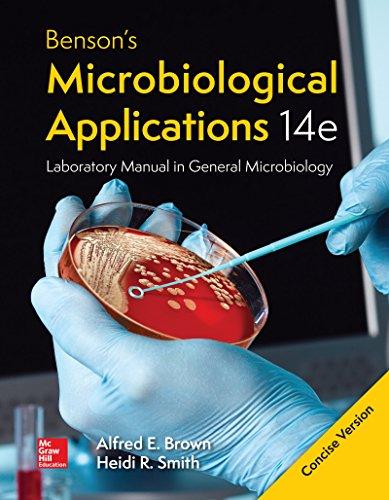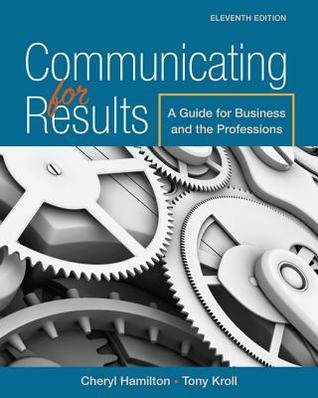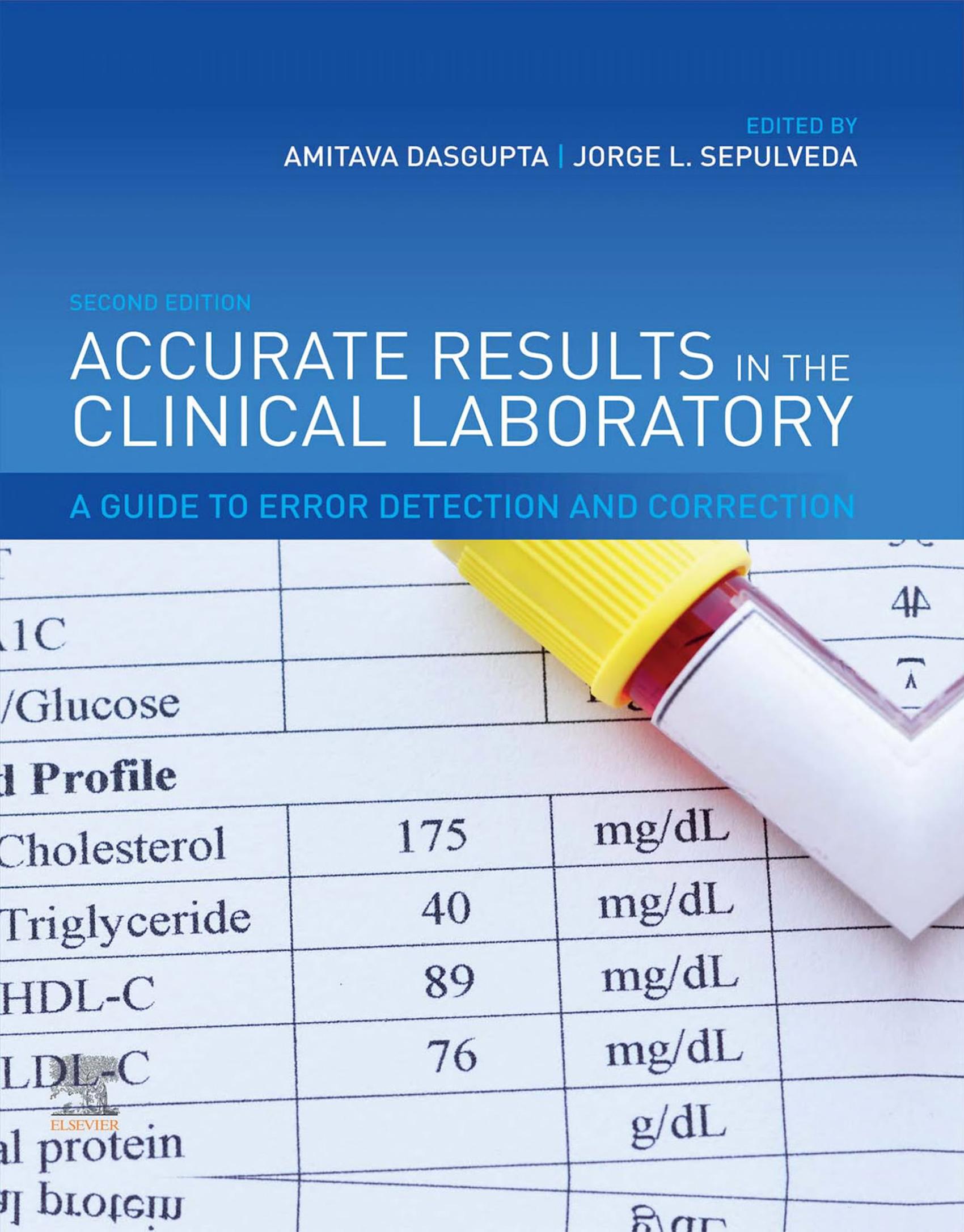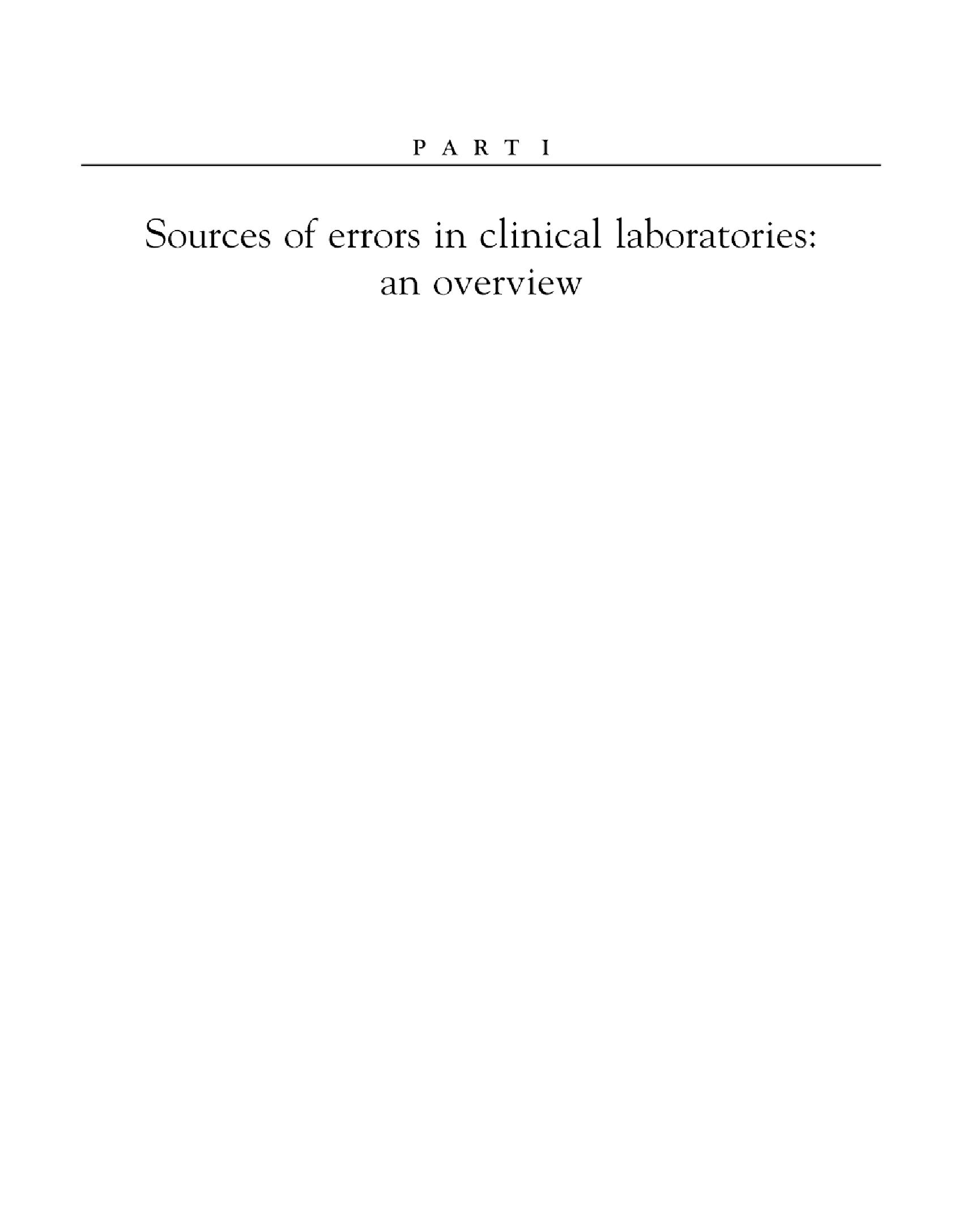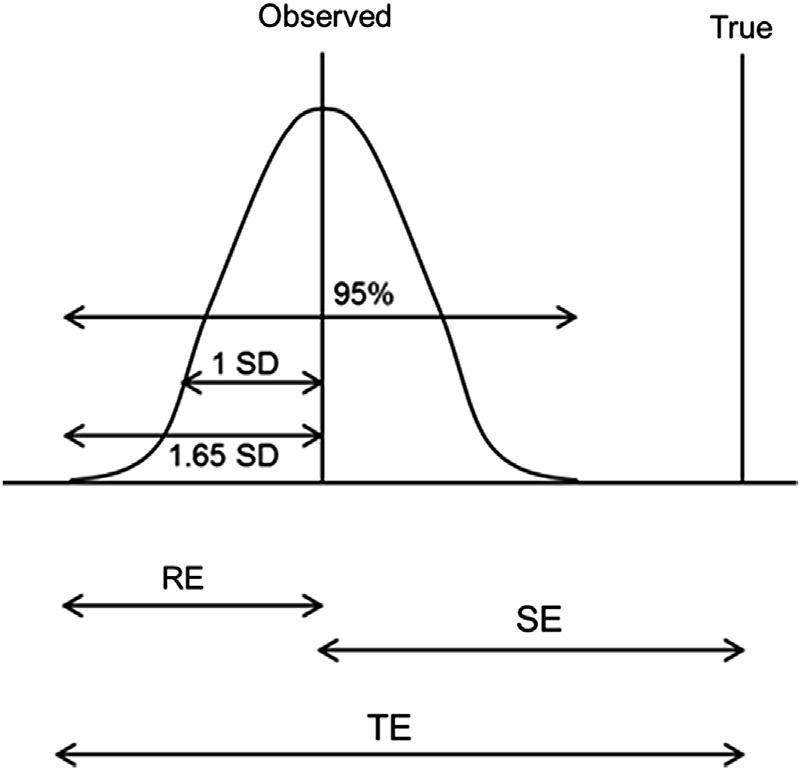Listofcontributors
AmidAbdullah,MD UniversityofCalgaryandCalgary LaboratoryServices,Calgary,AB,Canada
MariaP.Alfaro,PhD InstituteforGenomicMedicine, NationwideChildren’sHospital,Columbus,OH, UnitedStates
ChrisAltomare,BS DRUGSCANInc.,Horsham,PA, UnitedStates
LelandBaskin,MD UniversityofCalgaryandCalgary LaboratoryServices,Calgary,AB,Canada
LindsayA.L.Bazydlo,PhD DepartmentofPathology, UniversityofVirginia,Charlottesville,VA,UnitedStates
JessicaM.Boyd,PhD DepartmentofPathologyand LaboratoryMedicine,CummingSchoolofMedicine, UniversityofCalgary,Calgary,AB,Canada;Calgary LaboratoryServices,Calgary,AB,Canada
LarryA.Broussard,PhD DepartmentofClinicalLaboratory Sciences,LouisianaStateUniversityHealthSciencesCenter, NewOrleans,LA,UnitedStates
VioletaCha ´ vez,PhD DepartmentofPathologyand LaboratoryMedicine,UniversityofTexasMedicalSchoolat Houston,Houston,TX,UnitedStates
AlexChin,PhD UniversityofCalgaryandCalgary LaboratoryServices,Calgary,AB,Canada
AnthonyG.Costantino,PhD DRUGSCANInc.,Horsham, PA,UnitedStates
AmitavaDasgupta,PhD,DABCC DepartmentofPathology andLaboratoryMedicine,UniversityofTexasMcGovern MedicalSchool,Houston,TX,UnitedStates
PradipDatta,PhD SiemensHealthineers,Newark,DE, UnitedStates
RobertA.DeSimone,MD DepartmentofPathologyand LaboratoryMedicine,WeillCornellMedicine, NewYork-PresbyterianHospital,NewYork,NY, UnitedStates
UttamGarg,PhD DepartmentofPathologyandLaboratory Medicine,Children’sMercyHospitalsandClinics,The UniversityofMissouriSchoolofMedicine,KansasCity, MO,UnitedStates
NeilS.Harris,MD DepartmentofPathology,Immunology andLaboratoryMedicine,UniversityofFlorida,Collegeof Medicine,Gainesville,FL,UnitedStates
JoshuaHayden,PhD DepartmentofPathologyand LaboratoryMedicine,WeillCornellMedicalCenter, NewYork,NY,UnitedStates
SusanJ.Hsiao,MD,PhD DepartmentofPathologyandCell Biology,ColumbiaUniversityIrvingMedicalCenter, NewYork,NY,UnitedStates
LauraM.Jacobsen,MD DepartmentofPediatrics,Division ofEndocrinology,UniversityofFlorida,Collegeof Medicine,Gainesville,FL,UnitedStates
KamishaL.Johnson-Davis,PhD DepartmentofPathology, UniversityofUtahSchoolofMedicine,ARUPLaboratories, SaltLakeCity,UT,UnitedStates
StevenC.Kazmierczak,PhD DepartmentofPathology, OregonHealth&ScienceUniversity,Portland,OR, UnitedStates
ElaineLyon,PhD ClinicalServicesLaboratory, HudsonAlphaInstituteforBiotechnology,Huntsville,AL, UnitedStates
GwendolynA.McMillin,PhD DepartmentofPathology, UniversityofUtahSchoolofMedicine,ARUPLaboratories, SaltLakeCity,UT,UnitedStates
ChristopherNaugler,MD UniversityofCalgaryand CalgaryLaboratoryServices,Calgary,AB,Canada
ElenaG.Nedelcu,MD DepartmentofLaboratoryMedicine, UniversityofCaliforniaSanFrancisco,SanFrancisco,CA, UnitedStates
AndyNguyen,MD DepartmentofPathologyand LaboratoryMedicine,UniversityofTexasMcGovern MedicalSchool,Houston,TX,UnitedStates
OctaviaM.PeckPalmer,PhD DepartmentofPathology, UniversityofPittsburghSchoolofMedicine,Pittsburgh, PA,UnitedStates;DepartmentofCriticalCareMedicine, UniversityofPittsburghSchoolofMedicine,Pittsburgh,PA, UnitedStates;DepartmentofClinicalandTranslational Science,UniversityofPittsburghSchool,Pittsburgh,PA, UnitedStates
AmyL.Pyle-Eilola,PhD PathologyandLaboratory Medicine,NationwideChildren’sHospital,Columbus,OH, UnitedStates
S.M.HosseinSadrzadeh,PhD DepartmentofPathology andLaboratoryMedicine,CummingSchoolofMedicine, UniversityofCalgary,Calgary,AB,Canada;Calgary LaboratoryServices,Calgary,AB,Canada
JorgeL.Sepulveda,MD,PhD DepartmentofPathologyand CellBiology,ColumbiaUniversityVagelosCollegeof PhysiciansandSurgeons,NewYork,NY,UnitedStates
BrianRudolphShy,MD,PhD DepartmentofLaboratory Medicine,UniversityofCaliforniaSanFrancisco, SanFrancisco,CA,UnitedStates
AaronStella,PhD UniversityofMassachusettsLowell, Lowell,MA,UnitedStates
YvetteC.Tanhehco,PhD DepartmentofPathologyandCell Biology,ColumbiaUniversityIrvingMedicalCenter, NewYork-PresbyterianHospital,NewYork,NY, UnitedStates
AshokTholpady,MD DepartmentofPathologyand LaboratoryMedicine,UniversityofTexasMDAnderson CancerCenter,Houston,TX,UnitedStates
ChristinaTrambas,MD,PhD ChemicalPathologist, ChemicalPathologyDepartment,MelbournePathology, Collingwood,VIC,Australia
GeorgeVlad,PhD DepartmentofPathology&CellBiology, ColumbiaUniversityCollegeofPhysiciansandSurgeons, NewYork,NY,UnitedStates
AmerWahed,MD DepartmentofPathologyand LaboratoryMedicine,UniversityofTexasMcGovern MedicalSchool,Houston,TX,UnitedStates
WilliamE.Winter,MD DepartmentofPediatrics,Division ofEndocrinology,UniversityofFlorida,Collegeof Medicine,Gainesville,FL,UnitedStates;Departmentof Pathology,ImmunologyandLaboratoryMedicine, UniversityofFlorida,CollegeofMedicine,Gainesville,FL, UnitedStates
AlisonWoodworth,PhD PathologyandLaboratory Medicine,UniversityofKentuckyMedicalCenter, Lexington,KY,UnitedStates
Cliniciansmustmakedecisionsfrominformation presentedtothem,bothbythepatientandancillary resourcesavailabletothephysician.Laboratorydata generallyprovidequantitativeinformation,which maybemorehelpfultophysiciansthanthesubjective informationfromapatient’shistoryorphysicalexamination.Indeed,withtheprevalentpressurefor physicianstoseemorepatientsinalimitedtimeframe, laboratorytestinghasbecomeamoreessentialcomponentofapatient’sdiagnosticwork-up,partlyasatimesavingmeasurebutalsobecauseitdoesprovide informationagainstwhichpriororsubsequenttestresults,andhencepatients’health,maybecompared. Testsshouldbeorderediftheycouldbeexpectedto provideadditionalinformationbeyondthatobtained fromaphysician’sfirstencounterwithapatientandif theresultscouldbeexpectedtoinfluenceapatient’s care.Typically,cliniciansuseclinicallaboratorytesting asanadjuncttotheirhistorytakingandphysical examinationtohelpconfirmapreliminarydiagnosis, althoughsometestingmayestablishadiagnosis,for examplemoleculartestsforinbornerrorsofmetabolism. Microbiologicalculturesofbodyfluidsmaynotonly establishtheidentityofaninfectingorganism,butalso establishthetreatmentoftheassociatedmedicalcondition.Inoutpatientpracticecliniciansprimarilyorder teststoassistthemintheirdiagnosticpractice,whereas forhospitalizedpatients,inwhomadiagnosishas typicallybeenestablished,laboratorytestsareprimarily usedtomonitorapatient’sstatusandresponseto treatment.Testsoforganfunctionareusedtolookfor drugtoxicityandthemeasurementofthecirculating concentrationsofdrugswithnarrowtherapeuticwindowsisdonetoensurethatoptimaldrugdosingis achievedandmaintained.Theimportanceoflaboratory testingisevidentwhensomephysiciansrelymoreon laboratorydatathanapatient’sownassessmentasto howheorshefeels,openingthemtothecriticismof treatingthelaboratorydataratherthanthepatient.
Inthemodern,tightlyregulated,clinicallaboratory inadevelopedcountryfewerrorsarelikelytobemade, withthemajoritylabeledaslaboratoryerrorsoccurring outsidethelaboratoryitself.Onestudyfrom1995
showedthatwhenerrorsweremade75%stillproduced resultsthatfellwithinthereferenceinterval(when perhapstheyshouldnot) [1].Halfoftheothererrors wereassociatedwithresultsthatweresoabsurdthat theywerediscountedclinically.Suchresultsclearly shouldnothavebeenreleasedtoaphysicianbythe laboratoryandcouldlargelybeavoidedbyasimple reviewbyhumanorcomputerbeforebeingverified. However,theremaining12.5%oferrorsproducedresultsthatcouldhaveimpactedpatientmanagement. Theprevalenceoferrorsmaybelessnowthanpreviously,sincethequalityofanalyticaltestinghas improved,buttheramificationsofeacherrorarenot likelytobeless.Theconsequencesofanerrorvary dependingontheanalyteoranalytesaffectedand whetherthepatientinvolvedisaninpatientoroutpatient.Ifthepatientisaninpatientaphysician,if suspiciousabouttheresult,willlikelyhavetheopportunitytoverifytheresultbyrepeatingthetestorother testsaddressingthesamephysiologicalfunctions, beforetakingaction.However,iftheerroroccurswitha specimenfromanoutpatientcausinganabnormalresult toappearnormal,thatpatientmaybelosttofollow-up andpresentlaterwithadvanceddisease.Despitethe greatpreponderanceofaccurateresultscliniciansshould alwaysbewaryofanyresultthatdoesnotseemtofit withthepatient’sclinicalpicture.Itis,ofcourse,equally importantforphysiciansnottodismissanyresultthat theydonotlikeasa“laboratoryerror”.Theunexpected resultshouldalwayspromptanappropriatefollow-up. Thelaboratoryhasaresponsibilitytoensurethatphysicianshaveconfidenceinitstestresultswhilestill retainingahealthyskepticismaboutunexpectedresults.
Normallaboratorydatamayprovidesomeassurancetoworriedpatientswhobelievethattheymight haveamedicalproblem,anissueseeminglymore prevalentnowwiththereadyaccessibilityofmedical informationavailablethroughcomputersearchengines. Yetbothpatientsandphysicianstendtobecomeoverreliantonlaboratoryinformation,eithernotknowing orignoringtheweaknessoflaboratorytests,ingeneral. Aculturehasarisenofphysiciansandpatients believingthatthepublishedupperandlowerlimitsof
thereferencerange(orinterval)ofatestdefine normality.Theydonotrealizethatsucharangehas probablybeenderivedfrom95%ofagroupofpresumedhealthyindividuals,notnecessarilyselected withrespecttoalldemographicfactorsorhabitsthat wereanappropriatecomparativereferencefora particularpatient.Evenifappropriate,1in20individualswouldbeexpectedtohaveanabnormalresult forasingletest.Intheusualsituationinwhichmany testsareorderedtogethertheprobabilityofabnormal resultsinahealthyindividualincreasesinproportionto thenumberoftestsordered.Studieshavehypothesized thatthelikelihoodofallof20testsorderedatthesame timefallingwithintheirrespectivereferenceintervalsis only36%.Thestudiesperformedtoderivethereference limitsareusuallyconductedunderoptimizedconditionssuchasthetimesincethevolunteerlastate,hisor herpostureduringbloodcollectionand,oftenthetime ofday.Suchidealizedconditionsarerarelylikelytobe attainedinanofficeorhospitalpractice.
Factorsaffectingtheusefulnessoflaboratorydata mayariseinanyofthepreanalytical,analyticalorpostanalyticalphaseofthetestingcycle.Failurestoconsider thesefactorsdoconstituteerrors.Iftheseerrorsoccur priortocollectionofbloodorafterresultshavebeen produced,whilestilllikelytobelabeledaslaboratory errorsbecausetheyinvolvelaboratorytests,thelaboratorystaffsaretypicallynotliableforthem.Yetthe staffdoeshavetheresponsibilitytoeducatethoseindividualswhomayhavecausedthemtoensurethat sucherrorsdonotrecur.Ifpracticingclinicianswere abletousetheknowledgethatexperiencedlaboratorianshaveaboutthestrengthsandweaknessesof testsitislikelythatmuchmoreclinicallyusefulinformationcouldbeextractedfromexistingtests.Outside thelaboratory,physiciansrarelyareknowledgeable abouttheintra-andinterindividualvariationobserved whenserialstudiesareperformedonthesameindividuals.Forsometestsasignificantchangeforan individualmayoccurwhenhis/hertestvaluesshift fromtowardoneendofthereferenceintervaltoward theother.Thusatestvaluedoesnotnecessarilyhaveto exceedthereferencelimitsforittobeabnormalfora givenpatient.Ifthepreanalyticalstepsarenotstandardizedwhenrepeatedtestingisdoneonthesame person,itismorelikelythattrendsinlaboratorydata maybemissed.Thereisanonusoneveryoneinvolved intestorderingandtestperformancetostandardizethe processestofacilitatethemaximalextractionofinformationfromthelaboratorydata.Thecombinedgoal
shouldbeofpursuitofinformationratherthanjust data.Laboratoryinformationsystemsprovidethepotentialtointegratealllaboratorydatathatcanthenbe integratedwithclinicalandotherdiagnosticinformationbyhospitalinformationsystems.
Laboratoryactionstohighlightvaluesoutsidethe referenceintervalontheircomprehensivereportsoftest resultstophysicianswithcodessuchas“H”or“L”for highandlowvaluesexceedingthereferenceinterval havetendedtoobscuretheactualnumericalresultand tocementtheconceptthattheupperandlowerreference limitsdefinenormalityandthatthepresenceofoneof thesesymbolsnecessitatesfurthertesting.Theuseofthe referencelimitsaspublisheddecisionlimitsfornational programsforrenalfunction,lipidorglucosescreening hasagainplacedagreaterburdenonthevaluesthan theydeserve.Everymeasurementissubjecttoanalytical error,suchthatrepeateddeterminationswillnotalways yieldthesameresult,evenunderoptimaltestingconditions.Woulditthenbemoreappropriatetomake multiplemeasurementsanduseanaveragetoestablish thenumbertobeacteduponbyaclinician?
Muchoftheopportunitytoreduceerrors(inthe broadestsense)restswiththephysicianswhousetest results.Over-orderingleadstothepossibilityofmore errors.Inappropriateordering,forexamplerepetitive orderingoftestswhosepreviousresultshavebeen normal,ororderingthewrongtestorwrongsequence ofteststoelucidateaproblemshouldbeminimizedby carefulsupervisionbyattendingphysiciansoftheir traineesinvolvedinthedirectmanagementoftheir patients.Laboratoriansneedtobemoreinvolvedin teachingmedicalstudentssothatwhentheybecome residentstheirtestorderingpracticesarenotlearned fromseniorresidentswhohadlearnedtheirhabits fromthepreviousgenerationofresidents.Blanket applicationofclinicalguidelinesortestorder-setshas probablyledtomuchmisuseofclinicallaboratory tests.Manycliniciansandlaboratorianshaveattemptedtoreduceinappropriatetestordering,butthe overallconclusionseemstobethateducationis themosteffectivemeans.Unfortunately,theeducation needstobecontinuouslyreinforcedtohavealasting effect.Theeducationneedstoaddresstheclinical sensitivityofdiagnostictests,thecontextinwhich theyareorderedandtheirhalf-lives.Abovealleducationneedstoaddressissuesofbiologicalvariation andpreanalyticalfactorsthatmayaffecttestvalues, possiblymaskingtrendsormakingtheabnormal resultappearnormaland viceversa.
Thisbookprovidesacomprehensivereviewofthe factorsleadingtoerrorsinalltheareasofclinicallaboratorytesting.Assuchitwillbeofgreatvaluetoall laboratorydirectorsandtraineesinlaboratorymedicine andthetechnicalstaffwhoperformthetestsindaily practice.Byclearlyidentifyingproblemareas,thebook laysouttheopportunitiesforimprovement.Thisbook
shouldbeofequalvaluetoclinicians,astolaboratorians,astheyseektheoptimaloutcomefromtheir careoftheirpatients.
Reference
[1]GoldschmidtHMJ,LentRW.Grosserrorsandworkflowanalysis intheclinicallaboratory.KlinBiochemMetab1995;3:131 49.
DonaldS.YoungMD,Ph.D ProfessorofPathologyandLaboratoryMedicine UniversityofPennsylvaniaPerelmanCollegeof Medicine,Philadelphia,PA
Variation,errors,andqualityinthe clinicallaboratory
JorgeL.Sepulveda
DepartmentofPathologyandCellBiology,ColumbiaUniversityVagelosCollegeofPhysiciansandSurgeons, NewYork,NY,UnitedStates
INTRODUCTION
Recentstudiesdemonstratedthat invitro diagnostic testsareperformedinupto96%ofpatientsandthat upto80%ofclinicaldecisionsinvolveconsiderationof laboratoryresults [1].Inaddition,approximately 40 94%ofallobjectivehealthrecorddataarelaboratory results [2 4].Diagnosticerrorsaccountedfor26 78%of identifiedmedicalerrors [5] andnearly60%ofmalpracticeclaims [6],andwereinvolvedin17%ofadverse effectsduetomedicalerrorsinonelargestudy [7]. Undoubtedly,appropriateorderingandinterpretation ofaccuratetestresultsareessentialformajorclinicaldecisionsinvolvingdiseaseidentification,classification, treatment,andmonitoring.Factorsthatconstitutean accuratelaboratoryresultinvolvemorethananalytical accuracyandcanbesummarizedasfollows:
1. Therighttest,withtherightcostsandrightmethod, wasorderedfortherightpatient,attherighttime,for therightreason [8]:theimportanceofappropriatetest selectioncannotbeminimizedasstudieshaveshown thatatleast20%ofalltestordersareinappropriate [9], upto68%oftestsordereddonotcontributetoimprove patientmanagement [10] andconverselytestswerenot orderedwhenneededinnearly50%ofpatients [9]
2. Therightsamplewascollectedontherightpatient,at thecorrecttime,withappropriatepatient preparation.
3. Therighttechniquewasusedcollectingthesampleto avoidcontaminationwithintravenousfluids,tissue damage,prolongedvenousstasis,orhemolysis.
4. Thesamplewasproperlytransportedtothe laboratory,storedattherighttemperature,processed foranalysis,andanalyzedinamannerthatavoids artifactualchangesinthemeasuredanalytelevels.
5. Theanalyticalassaymeasuredtheconcentrationof theanalytecorrespondingtoits“true”level (comparedtoa“goldstandard”measurement)within aclinicallyacceptablemarginoferror(thetotal acceptableanalyticalerror(TAAE)).
6. Thereportreachingthecliniciancontainedtheright result,togetherwithinterpretativeinformation,such asareferencerangeandothercomments,aiding cliniciansinthedecision-makingprocess.
Failureatanyofthesestepscanresultinanerroneous ormisleadinglaboratoryresult,sometimeswithadverse outcomes.Forexample,interferenceswithpoint-of-care glucosetestingduetotreatmentwithmaltosecontaining fluidshaveledtofailuretorecognizesignificanthypoglycemiaandtomortalityorseveremorbidity [11].
ERRORSINCLINICALLABORATORY
Errorscanoccurinallthestepsinthelaboratory testingprocess,andsucherrorscanbeclassifiedas follows(see Table1.1):
1. Pre-analyticalsteps,encompassingthedecisionto test,transmissionoftheordertothelaboratoryfor analysis,patientpreparationandidentification, samplecollection,andspecimenprocessing.
2. Analyticalassay,whichproducesalaboratoryresult.
3. Post-analyticalsteps,involvingthetransmissionof thelaboratorydatatotheclinicalprovider,whouses theinformationfordecisionmaking.
Althoughminimizationofanalyticalerrorshasbeen themainfocusofdevelopmentsinlaboratorymedicine, theotherstepsaremorefrequentsourcesoferroneous
TABLE1.1 Typesoferrorintheclinicallaboratory.
PRE-ANALYTICAL
Testordering
• DuplicateOrder
• Orderingprovidernot identified
• Orderedtestnotperformed (includeadd-ons)
Samplecollection
• Unsuccessfulphlebotomy
• Traumaticphlebotomy
• Patientcomplaintabout phlebotomy
Specimentransport
• Inappropriatesample transportconditions
• Specimenleakedintransit
Specimenidentification
• Specimenunlabeled
• Specimenmislabeled:No NameorIDontube
• Specimenmislabeled:No Nameontube
• Specimenmislabeled: IncompleteIDontube
• Wrongspecimenlabel
• Wrongnameontube
• WrongIDontube
• Wrongbloodtype
Highpre-analyticalturnaroundtime
• Delayinreceivingspecimen inlab
• Delayinperformingtest
Specimenquality
• Specimencontaminatedwith infusionfluid
• Specimencontaminatedwith microbes
• Specimentoooldforanalysis
Specimencontainers
• Nospecimensreceived/ Missingtube
• Specimenlostinlaboratory
• Wrongspecimentype
• Inappropriatecontainer/tube type
• Wrongtubecollection instructions
• Ordermisinterpreted(test ordered <> intendedtest)
• Inappropriate/outmodedtest ordered
• Ordernotpulledbyspecimen collector
• Check-innotperformed(in theLIS)
• Wrongpatientpreparation (e.g.,non-fasting)
• Therapeuticdrugmonitoring testtimingerror
• Specimendamagedduring transport
• Specimendamagedduring centrifugation/analysis
• Date/timemissing
• Collector’sinitialsmissing
• Labelillegible
• Twocontradictorylabels
• Overlappinglabels
• Mismatchrequisition/label
• Specimeninformation misreadbyautomatedreader
TABLE1.1 Typesoferrorintheclinicallaboratory. cont’d
ANALYTICAL
• Highanalyticalturnaround time
• Instrumentcausedrandom error
• Instrumentmalfunction
• QCfailure
• QCnotcompleted
POST-ANALYTICAL
• Reportnotcompleted
• Delayinreportingresults
• Criticalresultsnotcalled
• Delayincallingcritical results
• Resultsreportedincorrectly
• Resultsreportedincorrectly fromoutsidelaboratory
• Resultsreportedtowrong provider
OTHER
• Proficiencytestfailure
• Productwastage
• Productnotdeliveredtimely
• Productrecall
• STATnotprocessedurgently
• Hemolyzed
• Clottedorplateletclumps
• Wrongpreservative/ anticoagulant
• Insufficientspecimen quantityforanalysis
• Tubefillingerror(toomuch anticoagulant)
• Tubefilingerror(toolittle anticoagulant)
• Emptytube
• Testperformby unauthorizedpersonnel
• Resultsdiscrepantwithother clinicalorlaboratorydata
• Testingnotcompleted
• Wrongtestperformed (differentfromtestordered)
• Reportedquestionable results,detectedby laboratory
• Reportedquestionable results,detectedbyclinician
• Failuretoappendproper comment
• Readbacknotdone
• Resultsmisinterpreted
• Failuretoactonresultsof tests
• Employeeinjury
• Safetyfailure
• Environmentalfailure
• Damagetoequipment
results.Ananalysisindicatedthatpre-analyticalerrors accountedfor62%ofallerrors,withpost-analyticalrepresenting23%andanalytical15%ofalllaboratoryerrors [12].Themostcommonpre-analyticalerrorsincluded incorrectordertransmission(atafrequencyofapproximately3%ofallorders)andhemolysis(approximately 0.3%ofallsamples) [13].Otherfrequentcausesofpreanalyticalerrorsincludethefollowing:
• Patientidentificationerror
• Tubefillingerror,emptytubes,missingtubes,or wrongsamplecontainer
• Samplecontaminationorcollectedfrominfusion route
• Inadequatesampletemperature
Particularattentionshouldbepaidtopatientidentificationbecauseerrorsinthiscriticalstepcanhavesevere consequences,includingfataloutcomes,forexample, duetotransfusionreactionsormisguidedtherapeutic decisions.Tominimizeidentificationerrors,health caresystemsareusingpoint-of-careidentificationsystems,whichtypicallyinvolvethefollowing:
1. Handhelddevicesconnectedtothelaboratory informationsystems(LIS)thatcanobjectively identifythepatientbyscanningapatient-attached barcode,typicallyawristband.
2. Currentlaboratoryorderscanberetrievedfrom theLIS.
3. Ideally,collectioninformation,suchascorrecttube types,isdisplayedinthedevice.
4. Bar-codedlabelsareprintedatthepatient’sside, minimizingthepossibilityofmisplacingthelabelson thewrongpatientsamples.
5. Afterattachingtocontainerswiththepatient samples,bar-codedlabelsshouldbescannedto confirmthattheywereappliedtotherightpatient, especiallyifanysignificantdelayhasoccurred betweenlabelprintingandsamplecollection.Inthis case,rescanningofpatient-attachedidentifiersshould bedoneinclosetemporalproximitytosample scanning.
Analyticalerrorsaremostlyduetointerferenceor otherunrecognizedcausesofinaccuracy,whereas instrumentrandomerrorsaccountedforonly2%ofall laboratoryerrorsinonestudy [12].Accordingtothat study,mostcommonpost-analyticalerrorsweredueto communicationbreakdownbetweenthelaboratory andtheclinicians,whereasonly1%weredueto miscommunicationwithinthelaboratory,and1%of theresultshadexcessiveturnaroundtimeforreporting [12].Post-analyticalerrorsduetoincorrecttranscription oflaboratorydatahavebeengreatlyreducedbecauseof theavailabilityofautomatedanalyzersandbidirectional interfaceswiththeLIS [12].However,transcription errorsandcalculationerrorsremainamajorareaof concerninthosetestingareaswithoutautomated interfacesbetweentheinstrumentandtheLIS.Further developmentstoreducereportingerrorsandminimize thetestingturnaroundtimeincludeauto-validationof testresultsfallingwithinpre-establishedrule-based parametersandsystemsforautomaticpagingofcritical resultstoproviders.
Whenclassifyingsourcesoferror,itisimportantto distinguishbetween cognitiveerrors,ormistakes,which areduetopoorknowledgeorjudgment,and noncognitiveerrors,commonlyknownasslipsandlapses,due tointerruptionsinaprocessthatisroutineorrelatively automatic.Whereasthefirsttypecanbepreventedby increasedtraining,competencyevaluation,andprocess aidssuchaschecklistsor“cheatsheets”summarizing importantstepsinaprocedure,noncognitiveerrorsare bestaddressedbyprocessimprovementandenvironmentre-engineeringtominimizedistractionsand fatigue.Furthermore,itisusefultoclassifyadverse occurrencesas active thatis,theimmediateresultof anactionbythepersonperformingatask oras latent or systemerrors,whicharesystemdeficienciesdueto poordesignorimplementationthatenableoramplify activeerrors.Inonestudy,onlyapproximately11%of theerrorswerecognitive,allinthepre-analyticalphase,
andapproximately33%oftheerrorswerelatent [12] Therefore,thevastmajorityoferrorsarenoncognitive slipsandlapsesperformedbythepersonneldirectly involvedintheprocess.Importantly,92%ofthepreanalytical,88%ofanalytical,and14%ofpost-analytical errorswerepreventable.Undoubtedly,humanfactors, engineering,andergonomics optimizationofsystems andprocessredesigningtoincludeincreasedautomation anduser-friendly,simple,andrule-basedfunctions, alerts,barriers,andvisualfeedback aremoreeffective thaneducationandpersonnel-specificsolutionsto consistentlyincreaselaboratoryqualityandminimize errors.
Immediatereportingoferrorstoadatabaseaccessible toallthepersonnelinthehealthcaresystem,followed byautomaticalertstoqualitymanagementpersonnel, isimportantforaccuratetrackingandtimelycorrection oflatenterrors.Inourexperience,reportingisimproved byusinganonlineformthatincludescheckboxesforthe mostcommontypesoferrorstogetherwithfree-textfor additionalinformation(Fig.1.1).Reviewerscansubsequentlyclassifyerrorsascognitive/noncognitive, latent/active,andinternaltolaboratory/internalto institution/externaltoinstitution;determineand classifyrootcausesasinvolvinghumanfactors(e.g., communicationandtrainingorjudgment),software,or physicalfactors(environment,instrument,hardware, etc.);andperformoutcomeanalysis.Outcomesoferrors canbeclassifiedasfollows:
1. Targetoferror(patient,staff,visitors,orequipment).
2. Actualoutcomeonaseverityscale(fromunnoticed tofatal).
3. Worstoutcomelikelihoodiferrorwasnotintercepted onthesameseverityscale,sincemanyerrorsare correctedbeforetheycauseinjury.
Errorswithsignificantoutcomesorlikelihoodsof adverseoutcomesshouldbediscussedbyqualitymanagementstaffandlaboratorydirectorstodetermine appropriatecorrectiveactionsandprocessimprovement initiatives.
Clearly,effortstoimproveaccuracyoflaboratory resultsshouldencompassallofthestepsofthetesting cycle,aconceptexpressedas“totaltestingprocess” or“brain-to-braintestingloop” [14].Approachesto achieveerrorminimizationderivedfromindustrialprocessesincludetotalqualitymanagement(TQM) [15]; leandynamicsandToyotaproductionsystems [16]; rootcauseanalysis(RCA) [17];healthcarefailuremodes andeffectsanalysis(HFMEA) [18,19];failurereview analysisandcorrectiveactionsystem(FRACAS) [20]; andSixSigma [21,22],whichaimsatminimizingthe variabilityofproductssuchthatthestatisticalfrequency oferrorsisbelow3.4permillion.Adetaileddescription
oftheseapproachesisbeyondthescopeofthisbook,but laboratoriansandqualitymanagementspecialists shouldbefamiliarwiththeseprinciplesforerrorprevention,errordetection,anderrormanagementto achieveefficient,high-qualitylaboratoryoperationand patientcare [15].
QUALITYIMPROVEMENTINCLINICAL LABORATORY
Quality isdefinedasallthefeaturesofaproductthat meettherequirementsofthecustomersandthehealth caresystem.Manyapproachesareusedtoimprove andensurethequalityoflaboratoryoperations.The conceptofTQMinvolvesaphilosophyofexcellence concernedwithallaspectsoflaboratoryoperations thatimpactonthequalityoftheresults.Specifically,
TQMapproachesapplyasystemofstatisticalprocess controltoolstomonitorqualityandproductivity(quality assurance)andencourageeffortstocontinuously improvethequalityoftheproducts,aconceptknown as continuousqualityimprovement.Amajorcomponent ofaqualityassuranceprogramis qualitycontrol (QC), whichinvolvestheuseofperiodicmeasurementsof productquality,thresholdsforacceptableperformance, andrejectionofproductsthatdonotmeetacceptability criteria.Mostnotably,QCisappliedtoallclinical laboratorytestingprocessesandequipment,including testingreagents,analyticalinstruments,centrifuges, andrefrigerators.Typically,foreachclinicaltest, externalQCmaterialswithknownperformance,also knownas controls,areruntwoorthreetimesdailyin parallelwithpatientspecimens.Controlsusuallyhave preassignedanalyteconcentrationscoveringimportant medicaldecisionlevels,oftenatlow,medium,and
FIG.1.1 Exampleofanerrorreportingformfortheclinicallaboratory.
highconcentrations.GoodlaboratoryQCpractice involvesestablishmentofalaboratory-andinstrumentspecificmeanandstandarddeviationforeachlotof eachcontrolandalsoasetofrulesintendedtomaximize errordetectionwhileminimizingfalserejections,suchas Westgardrules [23].Anotherimportantcomponentof qualityassuranceforclinicallaboratoriesisparticipation inproficiencytesting(orexternalqualityassessmentprogramssuchasproficiencysurveyssentbytheCollegeof AmericanPathologists),whichinvolvesthesharingof sampleswithalargenumberofotherlaboratoriesand comparisonoftheresultsfromeachlaboratorywithits peers,usuallywithreportingofthemeanandstandard deviation(SD)ofallthelaboratoriesrunningthesame analyzer/reagentcombination.CriteriaforQCrules andproficiencytestingacceptabilityshouldtakeinto considerationtheconceptoftotalacceptableanalytical errorbecausedeviationssmallerthanthetotalanalytical errorsareunlikelytobeclinicallysignificantandthereforedonotneedtobedetected.
Totalanalyticalerror(TAE)isusuallyconsideredto combinethefollowing(Fig.1.2):(1)systematicerror (SE),orbias,asdefinedbydeviationbetweenthe averagevaluesobtainedfromalargeseriesoftestresults andanacceptedreferenceorgoldstandardvalue,and (2)randomerror(RE),orimprecision,representedby thecoefficientofvariationofmultipleindependenttest resultsobtainedunderstipulatedconditions(CVa). Assuminganormaldistributionofrepeatedtestresults, atthe95%confidencelevel,theREisequalto1.65times theCVa forthemethod;consequently.
FIG.1.2 Totalanalyticalerror(TE)components:randomerror(RE), orimprecisionandsystematicerror(SE),orbias,whichcausethe differencebetweenthetruevalueandthemeasuredvalue.Random errorcanincreaseordecreasethedifferencefromthetruevalue. Becauseinanormaldistribution,95%oftheobservationsarecontained withinthemean 1.65standarddeviations(SDs),thetotalerrorwill notexceedbias þ 1.65 SDin95%oftheobservations.
TAE ¼ 1 65 CVa þ bias
Clinicallaboratoriesfrequentlyevaluateimprecision byperformingrepeatedmeasurementsoncontrolmaterials,preferablyusingrunsperformedondifferentdays (between-dayprecision),whereasbias(ortrueness)is assessedbycomparisonwithstandardreferencematerialswithassignedvaluesandalsobypeercomparison, whereeitherthepeermeanormedianareconsidered thereferencevalues.
Oneimportantconceptthatsomecliniciansdisregard isthatnolaboratorymeasurementisexemptoferror; thatis,itisimpossibletoproducealaboratoryresult with0%biasand0%imprecision.Theroleoftechnologicdevelopments,goodmanufacturingpractices, proficiencytesting,andQCistoidentifyandminimize themagnitudeoftheTAE.Apracticalapproachisto considertheclinicallyacceptabletotalanalyticalerror orTAAEforeachtest.Clinicalacceptabilityhasbeen definedbylegislation(e.g.,theClinicalLaboratory ImprovementAct(CLIA)),byclinicalexpertopinion, andbyscientificandstatisticalprinciplesthattake intoconsiderationexpectedsourcesofvariation.For example,CallumFraserproposedthatclinicallyacceptableimprecision,orrandomerror,shouldbelessthan halfoftheintraindividualbiologicvariationfortheanalyteandlessthan25%ofthetotalanalyticalerror [24] Thesystematicerror,orbias,shouldbelessthan25% ofthecombinedintraindividual(CVw)andinterindividualbiological(CVg)variation:
< 1 65 0 5 CVw þ 0 25 CV2w þ CV2 g q
Tablesofintra-andinterindividualbiologicalvariation,withcorrespondingallowableerrors,areavailable andfrequentlyupdated [25].See Table1.2 forexamples. Importantly,theallowableerrorsmaybedifferentat specificmedicaldecisionlevelsbecauseanalytical imprecisiontendstovarywiththeanalyteconcentration,withhigherimprecisionatlowerlevels.Also, biologicalvariationmaybedifferentinthevarious clinicalconditions,andavailabledatabasesarestarting toincorporatestudiesofbiologicvariationindifferent diseases [25].
Arelatedconceptisthe referencechangevalue (RCV), alsocalled significantchangevalue (SCV) thatis,the variabilityaroundameasurementthatisaconsequence ofanalyticalimprecision,within-subjectbiologicvariability,andthenumberofrepeatedtestsperformed [24,26,27].Assuminganormaldistribution,atthe95% confidencelevel,RCVcanbecalculatedasfollows:
¼ 1:96 2p CV2 a þ CV2w q
Becausemultiplerepeatsdecreaseimprecisionerrors, ifthechangeisdeterminedfromthemeanofrepeated
TAAE95%
RCV95%
Another random document with no related content on Scribd:
under the form of a journal, and from time to time I made what I called an orison. I transported, with a singular enjoyment, the terms of religion into the realm of my personal sensibility. I called that again the liturgy of the “I.”
One evening of the second week of my stay at the château, I employed several hours in writing out a general confession, that is to say, in drawing a picture of my diverse instincts since the first awakening of my consciousness. I arrived at this conclusion, that the essential trait of my nature, the characteristic of my inmost being, had always been the faculty of duplication. That means that I had always felt a tendency to be at once passionate and reflective, to live and to see myself live. But by imprisoning myself, as I wished, in pure reflection, by neglecting to live and to have only one eye open upon life, did I not risk resembling that Amiel whose dolorous journal appeared at that time, and sterilizing myself by the abuse of analysis to emptiness?
In vain did your image return to me to reinforce me in my resolution to live an abstract existence. I recall the phrases on love in the “Theory of the Passion,” and I saw you, at my age, abandoning yourself to the culpable experiences which already obscurely tempted me. I do not know if this chemistry of soul, so very complex and very sincere, will seem sufficiently lucid. The work by which an emotion is elaborated in us, and ends by resolving itself into an idea, remains so obscure that the idea is, sometimes, exactly contrary to that which simple reason could have foreseen!
Would it not have been natural, for example, that the kind of admiring antipathy roused in me by my encounter with Count André should have ended either in a declared repulsion, or in a definite admiration? In the first case, I should have thrown myself more into science, and in the other, have desired a more active morality, a more practical virility in my actions. But the natural for each one, is his own nature. Mine willed that the admiring antipathy for the count should become a principle of criticism, in regard to myself, that this criticism should produce a new theory of life, that this theory should
reveal my native disposition for passional curiosity, that the whole should dissolve itself into a nostalgia of sentimental experiences and that, just at this moment, a young girl should enter into my life whose presence alone would have sufficed to provoke the desire to please in any young man of my age.
But I was too intellectual for this desire to be born in my heart without passing through my head. At least, if I felt the charm of grace and delicacy which emanated from this child of twenty years, I felt it while believing that I reasoned about it. There are times when I ask myself if it was so, times when all my history appears more simple, and I say:
“I was honestly in love with Charlotte, because she was pretty, refined and tender, and I was young; then I gave some pretexts of the brain because I was a man proud of ideas and did not wish to love like other men.”
Ah! what a comfort when I persuade myself to speak in this way! I can pity myself instead of being a horror to myself, as happens when I recall the cold resolution, which I cherished in my mind, consigned to my notebook, and verified alas! by the event, the resolution, to injure this girl without loving her, from motives of purely psychological curiosity, from the pleasure of acting, of governing a living soul, of contemplating at will and directly this mechanism of passion which I had until then only studied in books, from the vanity of enriching my mind by a new experience.
But it is well, I could not have wished otherwise, impelled as I was by my heredities and my education, removed into the new medium where I was thrown by chance, and bitten, as I was by this ferocious spirit of rivalry against the insolent young man who was my opposite?
But this pure and tender girl was worthy of meeting a man who was not a cold and murderous calculating machine. Only to think of her melts and rends my heart.
I did not notice at first sight that perfection of the lines of the face, that brilliance of complexion, that royalty of bearing which distinguishes the very beautiful woman. Everything in her physiognomy was a delicate demi-tint, from the shade of her chestnut hair to the misty gray of her eyes and to her complexion which was neither pale nor rosy. One thought of modesty when studying her expression, and of fragility when remarking her feet, and hands, and the almost too minute grace of her movements.
Although she was rather short, she appeared tall because of the noble way in which her head was set on her slender neck. If Count André reproduced one of their common ancestors by an evident atavism, she resembled her father, but with so charming an ideality of lines that one could not admit the resemblance unless they were side by side. It was easy, however, to recognize in her the nervous disposition which produced hypochondria in her father.
Charlotte had a sensibility which was almost morbid, which was revealed at times by a slight tremulousness of hands and lips, those beautiful sinuous lips where dwelt a goodness almost divine. Her firm chin showed a rare strength of will in so frail an envelope, and I now understand that the depth of her eyes, sometimes motionless as if fixed on some object visible to herself alone, betrayed a fatal tendency to a fixed idea.
The first trait that I specially observed was her extreme kindness, and this was brought to my notice by little Lucien. The child told me that his sister had several times wished him to ask me if there was anything lacking in my room.
This is a very puerile detail, but it touched me because I felt very lonely in this great house where no person, since my arrival, had seemed to pay the least attention to me. The marquis appeared only at dinner, wrapped in a robe-de-chambre and groaning over his health or politics. The marquise was occupied in making the château comfortable, and held long conferences with an upholsterer from Clermont. Count André rode in the morning, hunted in the afternoon, and, in the evening, smoked his cigars without ever
addressing a word to me. The governess and the religieuselooked at one another and looked at me with a discretion which froze me.
My pupil was an idle and dull boy, who had the redeeming quality of being very simple, very confiding, and of telling me all that I wished to know of himself and the rest of his family. I learned in this way that their stay in the country this year was the work of Count André, which did not astonish me in the least, for I felt more and more that he was the real head of the family; I learned that the year preceding he had wished to marry his sister to one of his comrades, a M. de Plane, whom Charlotte had refused, and who had gone to Tonquin.
In our two daily classes, one in the morning from eight o’clock to half-past nine, the other in the afternoon from three o’clock until half-past four, I had a great deal of trouble to fix the attention of the little idler. Seated on his chair, opposite me on the other side of the table, and rolling his tongue against his cheek, while he covered the paper with his big awkward writing, he would now and then glance up at me.
He noticed on my face the least sign of abstraction. With the animal and sure instinct of children, he soon saw that I would make him go on with his lessons less quickly when he talked to me of his brother or sister, and so this innocent mouth revealed to me that there was, in this cold, strange house, some one who thought of me and of my comfort.
My mother had failed so much in this regard, although I might not wish to confess it! And it was this act of simple politeness which made me regard Mlle. de Jussat with more attention.
The second trait that I discovered in her was a taste for the romantic, not that she had read many romances, but as I have already told you, her sensibility was extreme, and this had given her an apprehension of the real.
Without herself suspecting it she was very different from her father, her mother and her brothers; and she could neither show
herself to them in the truth of her nature, nor see them in the truth of theirs without suffering. So she did show herself, and she forced herself not to see them. She formed, spontaneously and ingenuously, opinions of those she loved which were in harmony with her own heart and so directly contrary to the evidence that they would have seemed false or flattering in the eyes of a malevolent observer. She would say to her mother, who was so ordinary and material: “Mamma, you are so quick to see;” to her father so cruelly egotistical: “You are so kind, papa,” and to her brother who was so positive, so self-sufficient: “You understand everything,” and she believed it. But the delusion in which this gentle creature imprisoned herself, left her a prey to the most complete moral solitude, and deprived her, to a very dangerous degree, of all judgment of character.
She was as ignorant of herself as of others. She languished, unknown to herself, for the society of some one who should have sentiments in harmony with her own. For example, I observed in the first walks that we took together, that she was the only one who could really feel the beauty of the landscape formed by the lake, the woods that surround it, the distant volcanoes and the autumn sky, often more blue than the sky of summer because of the contrast of its azure with the gold of the leaves, and which was sometimes so veiled, so sadly vaporous and distant.
She would fall into silence without any apparent reason, but really because her whole being became dissolved into the charm of things about her. She possessed in the state of pure instinct and unconscious sensation the faculty which makes the great poets and the great lovers, namely, the faculty of forgetting oneself, of dispelling oneself, of losing oneself entirely in whatever touches the heart, whether it be a veiled horizon, a silent and yellow-tinted forest, a piece of music or a touching story.
I did not, at the beginning of our acquaintance, formulate the contrast between that combative animal her brother and this creature of sweetness and grace who ran up the stone staircases of
the château with a step so light that it seemed scarcely poised, and whose smile was so welcoming and yet so timid.
I will dare to tell all, since I repeat it, I am not writing in order to paint myself in beautiful colors, but to show myself as I am. I will not say that the desire to make myself beloved by this adorable child, in whose atmosphere I began to feel so much pleasure, was not caused by this contrast between her and her brother.
Perhaps the soul of this young girl became as a field of battle for the secret, the obscure antipathy which two weeks had transformed into hate? Perhaps there was concealed the cruel pleasure of humiliating the soldier, the gentleman, by outraging him in what he held most precious? I know that this is horrible, but I should not be worthy of being your pupil if I did not disclose the lowest depth of my heart. And, after all, this odious cloud of sensations may be only a necessary phenomenon, like the others, like the romantic grace of Charlotte, like the simple energy of her brother, and like my own complexities—so obscure even to myself.
§ IV. THE FIRST CRISIS.
I remember very distinctly the day on which the project of winning the love of the sister of Count André presented itself to me, no longer as a romantically visionary idea, but as a precise possibility, near, almost immediate.
After I had been at the château two months I went to Clermont to pass the New-Year holidays with my mother, and I had been back a week. The snow had been falling for forty-eight hours. The winters in our mountains are so severe that nothing but the marquis’ monomania can explain his obstinacy in remaining in this savage lone waste, which is indefinitely swept by sudden and violent gusts of wind.
It is proper to state that the marquise watched over the comfort of the household with a marvelous adjustment of daily resources, and although Aydat is considered isolated by the inhabitants of Saint-Saturnin and Saint-Amand-Tallende, the communication with Clermont remains open even in the worst rigor of the season. Then the season offers sudden and radiant changes, mornings of storm are suddenly succeeded by evenings of incomparable azure in which the country beams as if transformed by the enchantment of light.
This was the case on the day my fatal resolution became fixed and took form. I can see the lake now, covered with a thin sheet of ice, under which the supple shivering of the water could be discerned. I see the vast slope of the Cheyre, white with snow, its whiteness broken by dark spots of lava; and perfectly white, without a spot, rises the circle of mountains, the Puy de Dôme, the Puy de la Vache, that of Vichatel, that of De la Rodde, that of Mont Redon, while the forest of Rouillet stands out against the background of snow and azure.
Some minute details rise again before my eyes which were then scarcely noticed and have remained concealed, one knows not in what hiding-place of the memory. I see a cluster of birches whose despoiled branches are tinted with rose. I see the crystals which sparkle at the end of a tuft of broom which, thin and still green, marks the tracks of a fox on the immaculate carpet, and the flight of a magpie which cries out in the middle of the road, and this sharp cry renders the silence of this immense horizon almost perceptible. I see some yellow and brown sheep which are driven by a shepherd clothed in a blue blouse, wearing a large, low, round hat, and accompanied by a red and shaggy dog with shining yellow eyes, very near together.
Yes, I can see all this landscape, and the four persons who are walking on the road which leads toward Fontfrède: Mlle. Largeyx, Mlle. de Jussat, my pupil and myself. Charlotte wore an Astrakhan jacket; a fur boa was wrapped around her neck making her head appear still more petite and graceful under its Astrakhan toque. After
the long imprisonment in the château the keen air seemed to intoxicate her. Her cheeks were red, her small feet plunged radiantly into the snow, where they left their slight trace, and her eyes sparkled with delight at the beauty of nature—a privilege of simple hearts which is never felt when the soul has become desiccated by force of reasoning, abstract theories and certain kinds of reading.
I walked beside her and so rapidly that we were soon far ahead of Mlle. Largeyx, whose clogs slipped on the road. The child, sometimes in front, sometimes behind, stopped or ran on with the vivacity of a young animal. In the company of these two gay creatures I grew gloomy and taciturn. Was this the nervous irritation which makes us at certain times antipathetic to the joy which we see around us without sharing it? Was it the half-unconscious outline of my future plan, and did I wish to force the young girl to notice me by a kind of hostility against her pleasure?
During the whole of this walk, I, who had formed the habit of talking a great deal with her, scarcely responded by monosyllables to the admiring remarks which she addressed to me, as if she wished me to share in the pleasure of her emotions.
By brusque replies, and by silence, my bad humor became so evident that Mlle. de Jussat, in spite of her enthusiasm, could not fail to notice it. She glanced at me two or three times, with a question on her lips which she did not dare to formulate, then her face became sad. Her gayety fell little by little at contact with my sulkiness, and I could trace upon her transparent face the passage, by which she ceased to be sensible to the beauty of things and was conscious only of my sadness.
The moment came when she could no longer control the impression which this sadness made upon her, and, in a voice which timidity rendered a little stifled, she asked:
“Are you suffering. Monsieur Greslon?”
“No, mademoiselle,” I replied with a brusqueriewhich must have wounded her, for her voice trembled as she said:
“Then some one has done something to you? You are not as you usually are.”
“No one has done anything to me,” I answered, shaking my head; “but it is true,” I added, “that I have reasons for being sad, very sad, to-day. It is the anniversary of a great grief, which I cannot tell you.”
She looked at me again, and I could follow in her eyes the movements which agitated her, as one follows the movements of a watch through a glass case. I had seen her so uneasy at my attitude that she lost her feeling for the divine landscape. I saw her now, comforted that I had no cause for grief against her, but touched by my melancholy, curious to know the cause, and not daring to ask me. She only said:
“Pardon me for questioning you.” Then she was silent.
These few minutes sufficed to show me the place which I already occupied in her thoughts. Ah! before the proof of this delicate and noble interest, I should have been ashamed of my falsehood, for so it was, this soi-disant recollection of a great grief a gratuitous and instantaneous falsehood whose sudden invention has often astonished myself.
Why had I suddenly thought to clothe myself in the poetry of a great grief, I whose life, since the death of my father, had been so quiet, so free from any sacrifices? Had I yielded to the innate taste for duplicating myself always so strong? This romantic affectation, did it show the hysteria of vanity which urges some children to lie, without reason and with so much unexpectedness? Did a vague intuition cause me to see in this play of deception and melancholy the surest means of interesting the Count’s sister?
I cannot tell the precise motives which governed me at that moment. Assuredly I did not foresee either the effect of my assumed sadness or of my falsehood, but I remember that as soon as the effect was known a resolution was formed in my mind to go on to the end and see what impression I could produce on the soul of this
young girl, by continuing, with consciousness and calculation, the comedy half-instinctively begun in this luminous afternoon of January in presence of a magnificent landscape, which should have served as a frame for other dreams.
Now that the irreparable is accomplished, and by a retrospective penetration, horribly painful—for it convicts me of ignorance and of cruelty—I understand that I had already inspired Charlotte with the truest and the tenderest feelings. All the diplomatic psychology which I employed was only the odious and ridiculous work of a scholar in the science of the heart. I understand that I did not know how to inhale the flowers which bloomed naturally for me in this soul. I had only to let myself know and enjoy the emotions which presented themselves, to live a sentimental life as exalted and extended as that of my intellect.
Instead, I paralyzed my heart by ideas. I wished to conquer a soul already conquered, to play a game of chess, where I needed only to be simple, and I have not even the proud consolation of saying to myself that I have, at least, directed the drama of my destiny as I pleased, that I have combined the scenes, provoked the episodes, conducted the intrigue.
It was played entirely in her, and without my comprehending it in the least, this drama in which Death and Love, the two faithful workers of implacable nature, acted without my order while mocking at the complications of my analysis.
Charlotte loved me for reasons quite different from those which my ingenious psychology had arranged. She died in despair, when by the light of a tragic explanation she saw me in my true nature. Then I was so horrible to her that she thus gave me irrefutable proof that my subtle reflections were nothing to her.
I believed I could solve in this amour a problem of mental mechanism. Alas! I had simply met, without feeling its charm, a sincere and profound tenderness. Why did I not then divine what I see to-day with the clearness of the most cruel evidence?
Misled by the romantic side of her character, it was natural that this child should be deceived in me. My long studies had given me the appearance of not being quite well, which always interests a woman who is truly feminine. Having been brought up by my mother, my manners were gentle, my voice and gestures refined, and I was scrupulously careful of my person.
I had been introduced by the old master who recommended me, as a person of irreproachable nobility of ideas and character. This was enough to cause a very sensitive young girl to become interested in me in a very particular manner. Ah, well! I had no sooner recognized this interest than I thought how to abuse it instead of being touched by it.
Any one who had seen me in my room on the evening which followed this afternoon, seated at my table and writing, with a big book of analysis near me, would never have believed that this was a young man of scarcely twenty-two years, meditating on the sentiments which he inspired or wished to inspire in a young girl of twenty.
The château was asleep. I could hear only the steps of the footman as he extinguished the lamps on the staircase and in the corridors. The wind enveloped the vast building in its groanings, now plaintive, now soothing. The west wind is terrible on these heights, where, sometimes, it carries away in a single breath all the slates of a roof.
This lamentation of the wind has always increased in me the feeling of internal solitude. My fire burned gently, and I scribbled in my notebook, which I burned before my arrest, the occurrences of the day and the programme of the experience which I proposed to attempt upon the mind of Mlle. de Jussat. I had copied the passage on pity which is found in your “Theory of the Passions;” you remember it, my dear master, it begins:
“There is in the phenomenon of pity a physical element, and which, especially in women, is confined to the sexual emotion.”
It was through pity then, that I proposed to act first upon Charlotte. I would profit by the first falsehood by which I had already moved her, combining with it a succession of others, and thus make her love me by making her pity me. There was, in this use of the most respected of human sentiments for the profit of my curious fancy, something particularly contrary to the general prejudice, which flattered my pride most exquisitely.
While I wrote out this plan with philosophical text to support it, I imagined what Count André would think, if he could, as in the old legends, from the depths of his garrison town decipher the words which I had traced with my pen.
At the same time, the idea alone of directing at will the subtle movements of a woman’s brain, all this sentimental and intellectual clockwork so complicated and so tenuous, made me compare myself to Claude Bernard, to Pasteur and to their pupils. These savants vivisected animals. Was not I going to vivisect at length, a human soul?
In order to draw from this pity which had been surprised rather than provoked, all the result demanded, it must first be prolonged. To this end, I resolved to keep up the comedy of sadness by preparing for the day of an explanatory conversation, more or less distant, a long, touching romance of false confidences.
I devoted myself, during the week following our walk, to feigning a melancholy more or less absorbing, and to feigning it, not only in the presence of Charlotte, but also during the hours in which I was alone with my pupil, sure that the child would report to his sister the impressions of our tête-à-tête.
You see here, my dear master, the proof of the useless machinery I was preparing to employ. Was there any need of involving this boy, who had been confided to me, in this sad intrigue, and why should I join this ruse with the others, when Mlle. de Jussat did not for a moment doubt my sincerity?
We had our lessons, Lucien and I, in a large room dignified by the name of library, because of the shelves which furnished one side of the wall. There, behind the gratings lined with green linen, were innumerable volumes bound in sheepskin, notably all the volumes of the Encyclopedia. This was a legacy from the founder of the château, a great philosopher, who had built this habitation among the mountains for the purpose of bringing up his children in the midst of nature and after the precepts of Emile.
The portrait of this gentleman free-thinker, a mediocre painting in the taste of the period, with its powder, and a smile both sceptical and sensible, adorned one side of the door; on the other side was that of his wife, quite coquettish under a high coiffure and with patches on her cheeks.
In looking at these two paintings, while Lucien translated a bit from Ovid or from Titus Livius, I asked myself what my ancestors were doing for me during the century in which these two persons lived who were represented in these portraits. I imagined, these rustics from whom I am descended pushing the plow, pruning the vine, harrowing the ground in the foggy plains of Lorraine, like the peasants who passed on the road in front of the château, in all weathers, and who with boots to their knees, dragged a metaltipped stick fastened to the wrist by a strap.
This mental picture gave the charm of a kind of lawful vengeance to the care I took to compose my physiognomy. It is a singular thing, that although I might detest in theory the doctrines of the Revolution and the mediocre spiritualism which they conceal, I became again a plebeian in my profound joy in thinking that I, the great-grandson of these farmers, should perhaps by the force of my mind alone bring to disgrace the great-granddaughter of this great lord and this great lady.
I leaned my chin upon my hand, I forced my brow and my eyes to look sad, knowing that Lucien was watching the expression of my face, in the hope of interrupting his task by a talk. When he had several times observed that he did not see the welcoming smile, nor
the indulgent look, he himself became very anxious. As is natural, the poor boy took my sadness for severity, my silence for displeasure One morning he ventured to ask:
“Are you angry with me, monsieur?”
“No, my child,” I replied, patting his fresh cheek with my hand; and I continued to preserve my troubled look, while contemplating the snow which beat against the panes. It fell now from morning till evening in large whirling stars, covering and putting to sleep the whole country, and in the warm rooms of the château there was the silent charm of intimacy, a distant death of all the noises of the mountains; while through the window panes, covered with frost on the outside and a vapor within, the light sifted languorously.
This gave a background of mystery to the figure of melancholy which I made, and which I imposed on the observation of Charlotte whenever we met. When the breakfast bell reunited us in the diningroom, I surprised in the eyes with which she received me the same timid and compassionate curiosity which I had noticed during our walk, whence dated what I called in my journal my entrance into my laboratory.
She regarded me with the same look when we were all again together, in the salon at tea, under the light of the early lamps, then at the dinner table and again in the long solitude of the evening, unless, under pretext of having work to finish, I retired to my room.
The monotony of life and of conversation was so complete that there was nothing to help her to shake off the impression of mournful mystery which I had inflicted upon her.
The marquis, a prey to the contrasts of his character, cursed his fatal resolution to remain in this isolation. He announced for the next clear day a departure which he knew would be impossible. It would cost too much now, and beside, where could he go? He calculated the chances of seeing his Clermont friends who had several times breakfasted with him, but it was before the four hours between Aydat and the city had been doubled by the bad weather.
Then he installed himself at the card table, while the marquise, the governess and the religieuse applied themselves to their unending work.
It was my duty to look after Lucien who turned the leaves of a book of engravings or played at patience. I placed myself so that when she raised her eyes from the cards which she held in her hands while playing with her father, the young girl was obliged to see me. I had been interested in hypnotism, and I had in particular studied in all its details, in your “Anatomy of the Will,” the chapter devoted to the singular phenomena of certain moral denominations, which you have entitled: “Some demi-suggestions.” I depended on taking possession of this unoccupied mind, until the propitious moment in which, to complete this work of daily intercourse, I should decide to relate to her my story which, justifying my sadness, should end by engrossing her imagination.
This story I had manufactured upon two principles which you lay down, my dear master, in your beautiful chapter on Love. This chapter, the theories of the Ethics on the passions, and M. Ribot’s book on the “Maladies of the Will,” had become my breviaries. Permit me to recall these two principles, at least in their essence.
The first is that the majority of beings have sentiment only by imitation; abandoned to simple nature, love, for example, would be for them as for the animals, only a sensual instinct, dissipated as soon as satiated.
The second is that jealously may exist before love; consequently it may sometimes create it, and may often survive it. Much struck by the justness of this double remark, I argued that the romance which I should relate to Mlle. de Jussat ought to excite her imagination and irritate her vanity. I had succeeded in touching the cord of pity, I wished to touch that of sentimental emulation and that of self-love.
I had then, founded my story on this idea, that every woman interested in a man, is wounded in her vanity if this man shows that he is thinking of another woman. But twenty pages would be
necessary to show you how I studied over the problem of the invention of this fable.
The occasion to relate it to her was furnished by the victim herself, fifteen days after I had begun to put at work what I proudly called my experience. The marquis had been told that one volume of the Encyclopedia was devoted to cards. He wished to find there how to play some old games such as Imperiale, Ombre, and Manilla. This brilliant idea had come to him after breakfast, on seeing in a journal a report of a new game called Poker, apropos of which the journalist gave a list of old-fashioned games.
When this maniac had conceived a fancy he could not wait, and his daughter was obliged to go at once to the library, where I was occupied in taking notes. I laid aside Helvétius upon the “Mind,” which I had discovered among some other books of the eighteenth century. I placed myself at the disposition of Mlle. de Jussat to take down the volume which she desired, and, when she took it from my hands, she said with her habitual grace:
“I hope that we shall find here some game in which you can take a hand with us. We are so afraid that you do not feel at home here, you are always so sad.”
She said these words as if asking pardon for an indelicacy, which had impressed me before, and escaping the familiarity of her remark by a “we” which I too well knew to be untruthful. Her voice was so gentle, we were so alone that the time seemed to have come to explain my feigned sadness.
“Ah! mademoiselle,” I answered, “if you only knew my history.”
If Charlotte had not been the credulous creature, the romantic child that she was, in spite of her two or three seasons in Paris, she would have seen that I was beginning a tale prepared beforehand, by this introduction, by the turn of the sentences with which I continued. I was too clumsy, too awkwardly affected.
I told her then that I had been betrothed at Clermont to a young girl, but secretly. I thought to make this adventure more poetical in
her eyes by insinuating that this girl was a foreigner, a Russian visiting one of her relations. I added that this girl had allowed me to tell her that I loved her, and she had also told me that she loved me. We had exchanged vows, then she had gone away. A rich marriage offered, and she had betrayed me for money.
I was careful to insist on my poverty, and let her understand that my mother lived almost entirely on what I earned. This was a detail invented on the spot, for hypocrisy doubles itself in expression. In truth this was a scene of a childish and rascally comedy, which I played with very little skill. But the reasons which determined me to lie in this fashion were so special that they exacted an extraordinary penetration to be comprehended, a total attention of my mind, almost your genius, my dear master. The visible embarrassment of my position could so easily be attributed to the trouble inseparable from such remembrances. As I was perfectly cool while I was telling this fable, I could observe Charlotte. She listened without any sign of emotion, her eyes lowered on the big book which supported her hand. She took the book when I had finished, and replied in a blank voice, as they say, one of those voices which betrays no sentiment of the speaker:
“I do not understand how you could have had any confidence in this young girl, since she listened to you without the knowledge of her parents.”
And she went away with a simple inclination of her graceful head, carrying the book with her. How pretty she was in her dress of fine, light cloth, with her slender form, her small waist, her face quite long and lighted up by her thoughtful gray eyes! She was like a Madonna engraved after Memling, whose profile I had formerly so much admired, fervent, lovely and mournful, on the first page of a large copy of the “Imitation,” belonging to the Abbé Martel.
Explain to me this other enigma of the heart, you, the great psychologist; never have I felt more the charm of this pure and gentle being than at the moment when I had just lied to her, and lied so uselessly as I imagined from her response.
Yes, I took this response literally, which, on the contrary, should have encouraged me to hope. I did not guess that to have only listened to a confidence so intimate was for a being so proud and so reserved, so far above me, a proof of a very powerful sympathy. I did not consider that this almost severe remark was dictated in part by the secret jealousy which I had desired to arouse in her, in part by a need to strengthen herself in her own principles so as to justify to herself her excessive familiarity.
As she had not been able to read the falsehood in my story, so I had not seen the truth behind her reply.
I felt all the hopes which I had been building up for the past fortnight crumble before me. No. She was not interested in me with a genuine interest which I could transform into passion. I drew up the balance sheet of our relations. What proof had I of this interest? The delicacy of the material cares with which she had surrounded me? This was a simple effect of her goodness. Her attempt to find out the cause of my melancholy? Ah, well! she had been curious, that was all. The timid accent of her voice when she questioned me? I had been a fool not to recognize the habitual modesty of a delicate girl. Conclusion: my comedy of these two weeks, my grimaces àla Chatterton, the falsehood of my so-called drama, so many ridiculous maneuvers, had not advanced me a line in the heart I wished to conquer.
I turned again to my book, but I was no longer capable of fixing my attention on the abstract text of Helvétius. I recall this childishness, my dear master, that you may the better perceive what a strange mixture of innocence and depravity was elaborated in my mind.
What did this unexpected deception prove, if not that I had imagined I could direct the thought of Charlotte, by applying to her the laws of psychology borrowed from the philosophers, as absolutely as her brother directed the billiard balls? The white touches the red a little to the left, goes on the cushions, and returns to the other white. That is outlined by the hand on the paper, that is
explained by a formula, that is foreseen and is done ten times, twenty times, a hundred times, ten thousand times.
In spite of my enormous reading, perhaps because of it, I saw the play of the passions in this state of ideal simplicity. I did not comprehend till later how much I was deceived. In order to define the phenomena of the heart we must go to the vegetable, and not to the mechanical world for analogies, and to direct these phenomena we must employ the methods of the botanist, patient graftings, long waiting, careful training.
A sentiment is born, grows, expands, withers like a plant, by an evolution sometimes retarded, sometimes rapid, but always unconscious. The germ of pity, of jealousy, and of dangerous example planted by my ruse in the soul of Charlotte must develop its action, but only after days and days, and this action would be the more irresistible as she believed me to be in love with another and that in consequence she would not think to defend herself against me.
But to account in advance for this work and to discount the hope of it, one would have to be a Ribot, a Horwicz, an Adrien Sixte, that is, a connoisseur of souls, instead of one like me, ignorant that the plain over which he is walking will be covered with grain and not suspecting the approaching harvest.
The conviction that I had definitely failed in my first effort increased during the days which followed this false confidence. For Charlotte scarcely spoke to me.
I know now, from her own confession, that she concealed under this coldness a growing agitation which disconcerted her by its novelty, its force and its depth. In the meantime she appeared absorbed in the game of backgammon which the marquis had discovered in the Encyclopedia.
Recollecting that this had been the favorite pastime of his grandfather, the emigré, he had given up all other games. A
merchant of Clermont had been able to send him the necessary articles with which to satisfy this caprice.
The backgammon table was installed in the salon and father and daughter passed their evenings in throwing the dice, which made a dry noise against the wooden ledge. The cabalistic terms of little table, big table, outer table, double ace, double threes, two fives, were intermingled now with the words of the marquise and her two companions.
Sometimes the curé of Aydat, the Abbé Barthomeuf, an old priest who said mass in the chapel of the château on Thursdays when the weather was very severe, would relieve Charlotte by playing with the marquis. Although the marquis treated me with irreproachable politeness, he had never asked me if I wished to learn to play. The difference which he established between the abbé and myself humiliated me, by the oddest contradiction, for I much preferred to remain in my low chair reading a book, or observing the character of the different persons from their physiognomies.
Is it not always so when one is in a position which is thought to be inferior? Any inequality of treatment wounds the self-love. I took my revenge in observing the ridiculousness of the abbé, who professed, for the château in general and the marquis in particular, an almost idolatrous admiration. His face which was always red became apoplectic when he took his seat opposite the marquis, and the prospect of winning the silver coins designed to make the game more interesting made the dice-cup tremble in his hand at the decisive throws.
This observation did not occupy me long, and I turned to follow the young girl, who seated herself at her work near her mother.
The failure of my attempt to win her love had made me more cruel, in proportion to the admiration I had before felt for the innocent grace of this child. To confess all, I began to feel, in her atmosphere, emotions of an order more sensual than psychological. I was a young man, and I had in my flesh, in spite of my
philosophical resolutions, the memory of sex of which you have so authoritatively analyzed the persistent fatality and the invincible reviviscence.
How long this period of inertia at once impassioned and discouraged, might have lasted, I do not know. We were, Mlle. de Jussat and I, in a very peculiar situation, impelled one toward the other, she by a budding love of which she was ignorant, I by all the confused reasons which I have analyzed.
Although we were together so many hours of the day, neither of us then suspected the sentiments of the other. In such circumstances, one does not consider whether the events which mark a new crisis are effects or causes, whether their importance resides in themselves or whether they simply serve to manifest the latent conditions of the soul. But may we not put this question apropos of each destiny taken in its whole? How many times, above all since I consume my hours in this cell between these four whitewashed walls, seeing only the empty sky through four openings at the edge of the roof, in searching and searching again into my short history, have I asked myself if our fate creates our mind, or if it is not our mind which creates our fate, even our external destiny?
It happened one evening that the marquis, seated with his back to the fire in the robe-de-chambre, which he sometimes wore all day, spoke at length to his wife of an article in the morning paper. I was holding this paper at the time, and M. de Jussat said to me quite suddenly:
“Would you read this article, Monsieur Greslon?”
I admired, once more, the art with which this grand seigneur rendered the most trifling demands insolent. His tone alone was sufficient to chill me. I obeyed however, and began to read this chronicle, more finely written than such articles usually are, and in which were revived all the picturesqueness and coloring of a fancy ball, with a curious mixture of reporting and poetry.
During the reading the marquis regarded me in astonishment. I must tell you, my dear master, that at the time of my friendship with Emile, I had acquired a real talent for diction. During his illness my little comrade had no greater pleasure than to hear me read.
“You read very well, very well!” cried M. de Jussat when I had finished.
His astonishment made his eulogy a new wound to my selfesteem. It was too plain that he did not expect to find much talent in a silent and timid young man of Clermont, who had come to the château on the recommendation of old Limasset, to be a valet de lettres. Then, following as usual, the impulse of his caprice, he continued:
“That is an idea. You shall read for us in the evening. That will amuse us a little better than this trictrac. Little jan, big jan, it is always the same thing, and then the noise of the dice sets my teeth on edge. This beastly country! If the snow ever stops again, we will not stay here eight days. And what book are you going to begin with?”
Thus I found myself promoted to a new service, without even being allowed to consider whether it would interfere with my studies or not, for I often brought into the salon some of my books that I might study a little without leaving Lucien. But I did not for a moment think of evading this task. First the brusqueness of the marquis had brought me a glance almost supplicating from Charlotte, one of those glances by which a woman knows how to ask pardon, for the error of some one whom she loves. Then, a new project took form in my mind. Might not this task be utilized to the profit of the enterprise commenced, abandoned, and which the look of Mlle. de Jussat made me think was still possible?
To the question of the marquis upon the choice of the book, I responded that I would consider. And I looked for a work which would permit me to approach the prey around which I turned, as I
once saw, near the Puy du Dôme, a kite wheel around and above a poor little bird.
Was not this an opportunity to try by another method this influence of imitation, which I had vainly hoped from my false confidence? It is to you, my dear master, that we owe the strongest pages which have been written upon that which you so justly call the Literary Mind, upon this unconscious modeling of our heart to the resemblance of the passions painted by the poets.
I saw in this then, a means of acting upon Charlotte which I reproached myself for not having thought of before. But how was I to find a romance which was passionate enough to excite her, and outwardly correct enough to be read before the assembled family? I literally ransacked the library. Its incoherent and contrasted composition, reflected the residence of its successive masters and the chances of their taste.
There were all the principal works of the eighteenth century of which I have spoken—then a hiatus. During the emigration the château had remained unoccupied. Then a lot of romantic books in their first editions attested the literary aspirations of the father of the marquis, who had been the friend of Lamartine. Then came the worst of contemporaneous romances, those which are bought on the railway, half-bound, cut sometimes with the finger, or a page lost, and some treatises on political economy, an abandoned hobby of M. de Jussat.
At last I discovered amid all this rubbish a “Eugénie Grandet,” which appeared to me to fill the conditions desired. There is nothing more attractive to a fresh imagination than these idyls at once chaste and fervid in which innocence envelops passion in a penumbra of poesy. But the marquis must have known this celebrated romance by heart, and I apprehended that he would refuse to listen to it.
“Bravo!” he replied when I submitted my idea to him, “that is one of the books that one reads once, talks about always and entirely
forgets. I saw this Balzac once in Paris, at the Castries. It is more than forty years ago. I was a youngster then. But I remember him well, fat, short and stubby, noisy, important, with beautiful bright eyes and a common air.”
The fact is that after the first pages, he fell asleep, while the marquise. Mlle. Largeyx and the religieuseknit, and Lucien, who had recently come into possession of a box of colors conscientiously illuminated the illustrations of a large volume.
While reading I observed Charlotte, and it was not difficult to see that this time my calculation had been correct, and that she vibrated under the phrases of the romance as a violin under a skillful bow. Everything was prepared to receive this impression, from her feelings already stirred to her nerves strained by an influence of a physical kind. One cannot live with impunity for weeks in such an atmosphere as that of the château, always warm, nearly stifling.
From that evening, this child hung on my lips as the ingenuous loves of Eugénie and her cousin Charles disclosed their touching episodes. The same instinct of comedy which had guided me in my false confidence made me throw into every phrase the intonation which I thought would please her most.
I certainly enjoyed this book, although I preferred ten other of Balzac’s works, such, for example, as the “Curé de Tours,” which are veritable literary compendiums, each phrase of which contains more philosophy than a scholium of Spinoza.
I forced myself to appear touched by the misfortunes of the miser’s daughter, in my most secret fibres; and my voice grew pitiful over the sweet recluse of Saumur.
Here, as before, I gave myself useless trouble. There was no need of an art so complicated. In the crisis of imaginative sensibility through which Charlotte was passing, any romance of love was a peril.
If the father and mother had possessed, even in a feeble degree, that spirit of observation which parents ought to exercise without
ceasing, they would have divined this peril of their daughter, more and more captivated during the three evenings that this reading lasted. The marquise simply remarked that characters so black as father Grandet and the cousin did not exist. As for the marquis, he knew too much of the world to proffer any such opinion, he formulated the cause of his ennui during the reading.
“It is decidedly overdrawn. These unfinished descriptions, these analyses, these numerical calculations! They are all very good, I do not say they are not. But when I read a romance I wish to be amused.”
And he concluded that he must send to the Library of Clermont immediately for the comedies of Labiche. I was in despair at this new fancy. I would again be powerless to act upon the imagination of the young girl, just at the moment when I could feel success probable. This showed that I did not know the need which this soul, already touched, felt, unknown to herself, the need of drawing near to me, of comprehending me and making herself comprehended by me, of living in contact with my mind.
The next day after that on which the marquis had issued the decree of proscription against analytical romances, Mlle. de Jussat entered the library at the hour I was there with her brother. She came to replace the volume of the Encyclopedia; and with a halfembarrassed smile:
“I would like to ask a favor of you,” she said timidly. “I have a great deal of time here, with which I do not know very well what to do. I would like to have your advice in regard to my reading. The book which you chose the other day gave me a great deal of pleasure.” She added: “Ordinarily romances weary me, but that one was very interesting.”
I felt, at hearing her speak in that way, the joy which Count André must have tasted when he saw the enemy whom he killed during the war put his inquisitive head above the wall. It seemed to me as if I, too, held my human game at the end of my gun.
The response to this request appeared to me so important that I feigned to be very much embarrassed. In thanking her for her confidence I said to her that she had charged me with a very delicate mission for which I felt myself incapable. In brief, I made believe to decline a favor, which I was charmed to intoxication to have obtained. She insisted, and I promised to give her the next day a list of books.
I passed the evening and a part of the night in taking and rejecting in my mind hundreds of volumes. At last I repeated aloud my father’s favorite formula: “Let us proceed methodically,” and I asked myself how books had acted on my imagination, in my adolescence, and what books?
I stated that I had been attracted most of all toward literature by the unknown of sentimental experience. It was the desire to assimilate unexperienced emotions which had bewitched me. I concluded that this was the general law of literary intoxication. I must then choose for this girl some books which should awake in her the same ideas while taking into account the difference of our characters.
Charlotte was refined, pure and tender. She must be led into the dangerous road of romantic curiosity by descriptions of sentiments analogous to her own heart. I judged that the “Dominique” of Fromentin, the “Princesse de Clèves,” “Valérie,” “Julia de Trécœur,” the “Lys dans la vallée,” the “Reisebilder” of Heine, certain comedies of Musset, in particular “On ne badine pas avec l’amour,” the first poetry of Sully Prudhomme and that of Vigny, would best serve my purpose.
I took the trouble to write out this list, accompanying it with a tempting commentary, in which I indicated in my best manner the shade of delicacy proper to each of these writers. That is the letter which the poor child had kept, and of which the magistrates said it seemed like the beginning of courtship. Ah! the strange courtship, and so different from the vulgar ambition of the marriage with which these gross minds have stupidly reproached me! If I had not a
reason of pride for refusing to defend myself which I will give you at the end of this memoir, I would be silent from disgust of these low intelligences, of which not one would be able to comprehend an action dictated by pure reason. If they had only made you, my dear master, and the other princes of modern thought, my judges! Then I would speak, as I am speaking now to you.
The works thus designated arrived from Clermont. They were the object of no remark on the part of the marquis. It is necessary to have another reach of mind than that of this poor man to comprehend that there are no bad books. There are bad moments in which to read the best of books. You have a comparison so just in your chapter on “L’âme littéraire,” when you liken the sore opened in certain imaginations by certain readings to the well-known phenomenon produced on the body poisoned by diabetes. The most inoffensive prick becomes envenomed with gangrene.
If there were need of a proof of this theory of “the preliminary state,” as you say again, I should find it in the fact that Mlle. de Jussat sought in these books for things so diverse, for information about me, my manner of feeling, of thinking, of understanding life and character.
Every chapter, every page of these dangerous volumes became an occasion for questioning me long, passionately, and ingenuously. I am certain that she was sincere, and that she did not imagine she was doing anything wrong when she came to talk with me apropos of such or such a phrase about Dominique or Julia, Félix de Vandenesse or Perdican. I remember the horror which she felt for the young man, the most captivating and the most guilty of Musset’s heroes, and the heat with which I stigmatized his duplicity of heart between Camille and Rosette.
Now, there was no personage in any book, who pleased me to the same degree as this lover at once traitorous and sincere, disloyal and loving, ingénu and roué, who achieved, in his way, his experience of sentimental vivisection upon his pretty and proud cousin.
I have cited this example, among twenty others, to give you an idea of the conversations which we had now in this château in which we were so strangely isolated. No one watched us. The dissimulation in which I had masked myself on my arrival continued to cover me.
The marquis and the marquise had formed from the first an image entirely different from my real nature. They took no pains to verify whether this first impression were exact or false.
The good Mlle. Largeyx, installed in the comfort of her complacent parasitism, was much too innocent to suspect the thoughts of depravity perfectly intellectual which were revolving in my mind.
The Abbé Bartholomew and Sister Anaclet, whom a secret rivalry separated, concealed under the form of an amiability quite ecclesiastic, had only one care, that of pleasing the master and mistress of the château, the priest for the benefit of his church, and the religieusefor that of her order.
Lucien was too young, and, as for the domestics, I had not yet learned what perfidy was veiled under the impassibility of their smooth faces and the irreproachable appearance of their brown livery with its gold buttons.
We were then free, Charlotte and I, to talk the whole day. She appeared first in the morning, in the dining-room where my pupil and I took our tea, and there, under the pretext of breakfasting together, we talked at one corner of the table, she in all the perfumed freshness of her bath, with her hair hanging down in a heavy plait, and the suppleness of her lovely form visible under the material of her half-fitting morning dress.
I saw her again in the library where she always had some excuse for coming; and by this time her hair was dressed, and she had assumed the toilette of the day. We met again in the drawing-room before the second breakfast and still again; and she waited upon us with her customary grace, distributing the coffee a little hurriedly
that she might linger near me whom she served last, which permitted us to talk in an angle of the window.
When the weather would permit we went out, the governess, Charlotte, my pupil, and I, in the afternoon. At five-o’clock tea we were again together, then at dinner, when I sat near her, and in the evening we conversed almost as if we were really alone.
I mentally compared the phenomena which were taking place in this girl, to that which I had observed several times in taming animals. At one time I had written some chapters on animal psychology. A theorem of Spinoza had served me for a starting point. I cannot now recall the text, but this is the sense: to reproduce a movement, you must do it yourself. That is true of man, and it is true of the animal. A savant of rare merit and whom you know well, M. Espinas, has explained that all society is founded on resemblance. I have concluded that for a man to tame an animal, to bring it to live in his society, he must, in his relations with this animal, make only those movements which the animal can reproduce, that is to resemble him.
I have verified this law in establishing the species of analogy of expression between a hunter and his dog, for example. I found—and this was the sign that Mlle. de Jussat was becoming a little tamer each day—that we began to employ analogous expressions, turns of thought almost the same. I found myself accenting my words as she did hers, and I observed in her gestures which resembled mine. In fine, I became a part of her life, without her perceiving it, so careful was I not to startle this soul just ready to be taken by a word that would cause her to feel her danger.
This life of watchful diplomacy, to which I was condemned during nearly two months that these simply intellectual relations lasted, did not pass without almost daily internal struggles. To interest this mind, to invade this imagination little by little, was not all of my programme. I wished to be loved, and I knew that this moral interest was only the beginning of passion. This beginning ought to
lead in order not to remain useless to something more than a sentimental intimacy.
There is in your “Theory of the Passions,” my dear master, a note which I read so much at that time that I know the text by heart: “A well-prepared study of the lives of professional libertines,” say you, “would throw a definite light upon the problem of the birth of love. But the documents are lacking. These men have nearly all been men of action, and who, in consequence, did not know how to relate. However, some works of a superior psychological interest, the “Memoires” of Casanova, the “Private Life of Marshal de Richelieu,” the chapter of Saint-Simon on Lauzun, authorize us to say that nineteen times out of twenty audacity and physical familiarity are the surest means of creating love. This hypothesis confirms our doctrine on the animal origin of this passion.”
Sometimes when we were alone together, and she moved, and her feet approached mine, and when she breathed and I felt that she was a living creature, the feverish wave of intoxication ran through my veins, and I was obliged to turn my eyes away, for their expression would have made her afraid. Often also, when I was away from her, it seemed to me that audacity would be much more easy as it would be more complete. I resolved then to clasp her in my arms, to press my lips to hers. I saw her feeling badly at my caress, overcome, confounded by this revelation of my ardor. What would happen then? My heart beat at this idea. It was not the fear of being driven from the château that held me back. It was more shameful to my pride not to dare. And I did not dare. The inability to act is a trait of my character, but only when I am not sustained by an idea. Let the idea be there and it infuses an invincible energy into my being. To go to my death would be easy. You will see that, if I am condemned. No, what paralyzed me near Mlle. de Jussat as by a magnetic influence was herpurity! At least I have felt, with singular force, this recoil before innocence.
Often when I felt this invisible barrier between Charlotte and myself, I have recalled the legends of guardian angels, and
